Developing Manager Skills
VerifiedAdded on 2020/02/03
|13
|4129
|46
Report
AI Summary
This report analyzes the development of managerial skills and competencies within the context of Visit London. It covers various management styles, leadership characteristics, communication methods, and personal development strategies. The report includes a personal SWOT analysis and a career development plan aimed at enhancing skills necessary for a successful career in management.
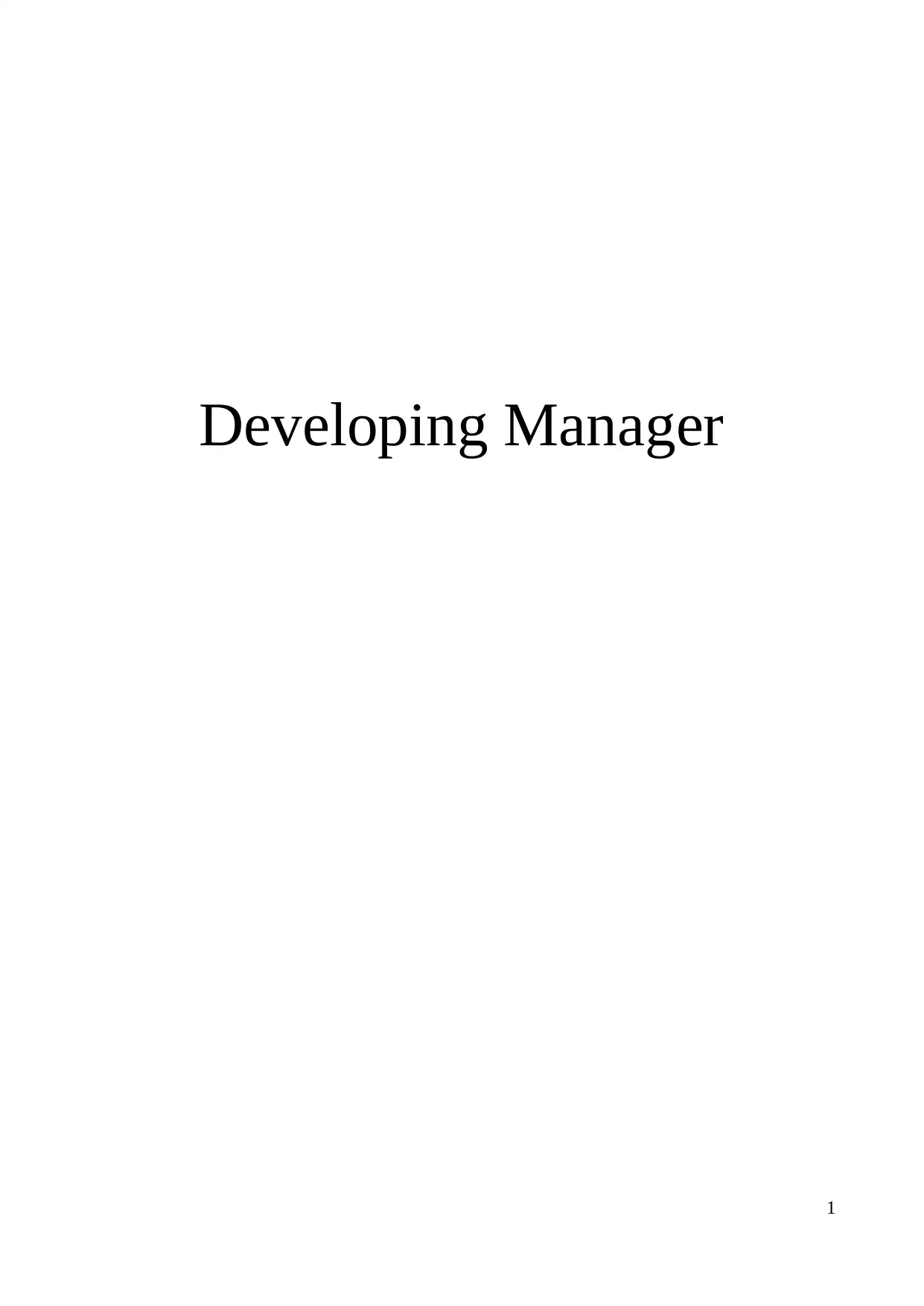
Developing Manager
1
1
Paraphrase This Document
Need a fresh take? Get an instant paraphrase of this document with our AI Paraphraser
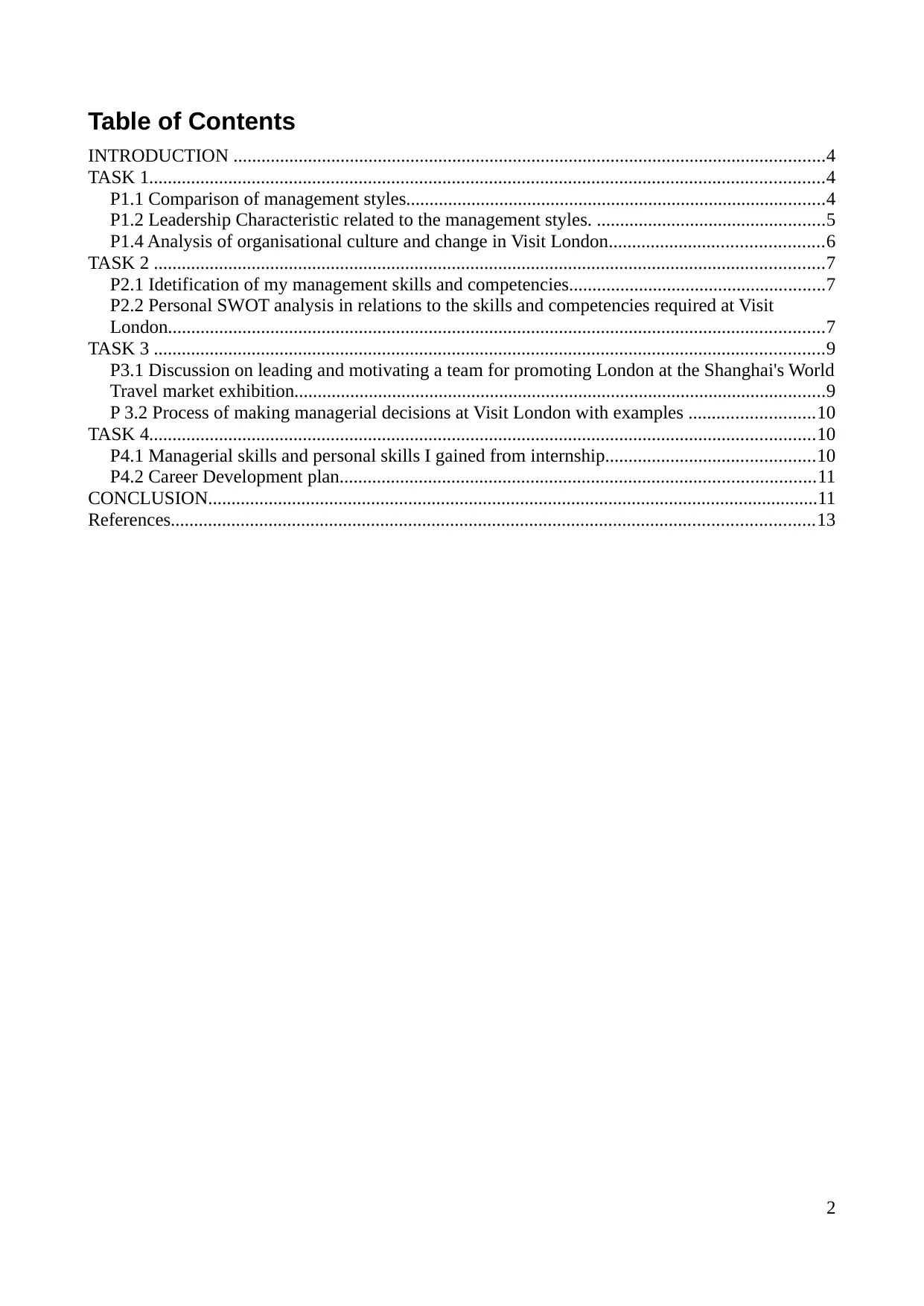
Table of Contents
INTRODUCTION ...............................................................................................................................4
TASK 1.................................................................................................................................................4
P1.1 Comparison of management styles..........................................................................................4
P1.2 Leadership Characteristic related to the management styles. .................................................5
P1.4 Analysis of organisational culture and change in Visit London..............................................6
TASK 2 ................................................................................................................................................7
P2.1 Idetification of my management skills and competencies.......................................................7
P2.2 Personal SWOT analysis in relations to the skills and competencies required at Visit
London.............................................................................................................................................7
TASK 3 ................................................................................................................................................9
P3.1 Discussion on leading and motivating a team for promoting London at the Shanghai's World
Travel market exhibition..................................................................................................................9
P 3.2 Process of making managerial decisions at Visit London with examples ...........................10
TASK 4...............................................................................................................................................10
P4.1 Managerial skills and personal skills I gained from internship.............................................10
P4.2 Career Development plan......................................................................................................11
CONCLUSION...................................................................................................................................11
References..........................................................................................................................................13
2
INTRODUCTION ...............................................................................................................................4
TASK 1.................................................................................................................................................4
P1.1 Comparison of management styles..........................................................................................4
P1.2 Leadership Characteristic related to the management styles. .................................................5
P1.4 Analysis of organisational culture and change in Visit London..............................................6
TASK 2 ................................................................................................................................................7
P2.1 Idetification of my management skills and competencies.......................................................7
P2.2 Personal SWOT analysis in relations to the skills and competencies required at Visit
London.............................................................................................................................................7
TASK 3 ................................................................................................................................................9
P3.1 Discussion on leading and motivating a team for promoting London at the Shanghai's World
Travel market exhibition..................................................................................................................9
P 3.2 Process of making managerial decisions at Visit London with examples ...........................10
TASK 4...............................................................................................................................................10
P4.1 Managerial skills and personal skills I gained from internship.............................................10
P4.2 Career Development plan......................................................................................................11
CONCLUSION...................................................................................................................................11
References..........................................................................................................................................13
2
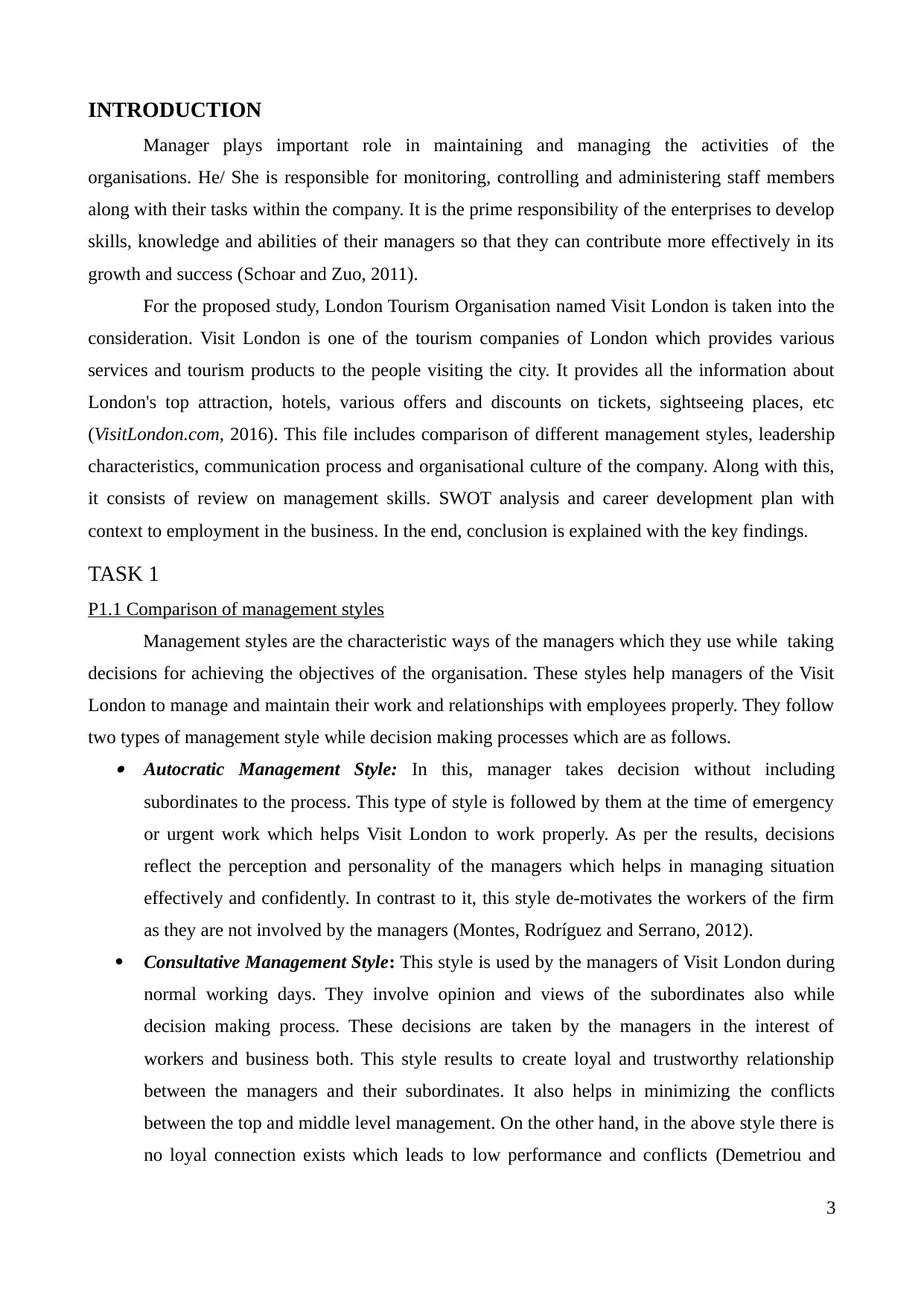
INTRODUCTION
Manager plays important role in maintaining and managing the activities of the
organisations. He/ She is responsible for monitoring, controlling and administering staff members
along with their tasks within the company. It is the prime responsibility of the enterprises to develop
skills, knowledge and abilities of their managers so that they can contribute more effectively in its
growth and success (Schoar and Zuo, 2011).
For the proposed study, London Tourism Organisation named Visit London is taken into the
consideration. Visit London is one of the tourism companies of London which provides various
services and tourism products to the people visiting the city. It provides all the information about
London's top attraction, hotels, various offers and discounts on tickets, sightseeing places, etc
(VisitLondon.com, 2016). This file includes comparison of different management styles, leadership
characteristics, communication process and organisational culture of the company. Along with this,
it consists of review on management skills. SWOT analysis and career development plan with
context to employment in the business. In the end, conclusion is explained with the key findings.
TASK 1
P1.1 Comparison of management styles
Management styles are the characteristic ways of the managers which they use while taking
decisions for achieving the objectives of the organisation. These styles help managers of the Visit
London to manage and maintain their work and relationships with employees properly. They follow
two types of management style while decision making processes which are as follows. Autocratic Management Style: In this, manager takes decision without including
subordinates to the process. This type of style is followed by them at the time of emergency
or urgent work which helps Visit London to work properly. As per the results, decisions
reflect the perception and personality of the managers which helps in managing situation
effectively and confidently. In contrast to it, this style de-motivates the workers of the firm
as they are not involved by the managers (Montes, Rodríguez and Serrano, 2012).
Consultative Management Style: This style is used by the managers of Visit London during
normal working days. They involve opinion and views of the subordinates also while
decision making process. These decisions are taken by the managers in the interest of
workers and business both. This style results to create loyal and trustworthy relationship
between the managers and their subordinates. It also helps in minimizing the conflicts
between the top and middle level management. On the other hand, in the above style there is
no loyal connection exists which leads to low performance and conflicts (Demetriou and
3
Manager plays important role in maintaining and managing the activities of the
organisations. He/ She is responsible for monitoring, controlling and administering staff members
along with their tasks within the company. It is the prime responsibility of the enterprises to develop
skills, knowledge and abilities of their managers so that they can contribute more effectively in its
growth and success (Schoar and Zuo, 2011).
For the proposed study, London Tourism Organisation named Visit London is taken into the
consideration. Visit London is one of the tourism companies of London which provides various
services and tourism products to the people visiting the city. It provides all the information about
London's top attraction, hotels, various offers and discounts on tickets, sightseeing places, etc
(VisitLondon.com, 2016). This file includes comparison of different management styles, leadership
characteristics, communication process and organisational culture of the company. Along with this,
it consists of review on management skills. SWOT analysis and career development plan with
context to employment in the business. In the end, conclusion is explained with the key findings.
TASK 1
P1.1 Comparison of management styles
Management styles are the characteristic ways of the managers which they use while taking
decisions for achieving the objectives of the organisation. These styles help managers of the Visit
London to manage and maintain their work and relationships with employees properly. They follow
two types of management style while decision making processes which are as follows. Autocratic Management Style: In this, manager takes decision without including
subordinates to the process. This type of style is followed by them at the time of emergency
or urgent work which helps Visit London to work properly. As per the results, decisions
reflect the perception and personality of the managers which helps in managing situation
effectively and confidently. In contrast to it, this style de-motivates the workers of the firm
as they are not involved by the managers (Montes, Rodríguez and Serrano, 2012).
Consultative Management Style: This style is used by the managers of Visit London during
normal working days. They involve opinion and views of the subordinates also while
decision making process. These decisions are taken by the managers in the interest of
workers and business both. This style results to create loyal and trustworthy relationship
between the managers and their subordinates. It also helps in minimizing the conflicts
between the top and middle level management. On the other hand, in the above style there is
no loyal connection exists which leads to low performance and conflicts (Demetriou and
3
⊘ This is a preview!⊘
Do you want full access?
Subscribe today to unlock all pages.

Trusted by 1+ million students worldwide
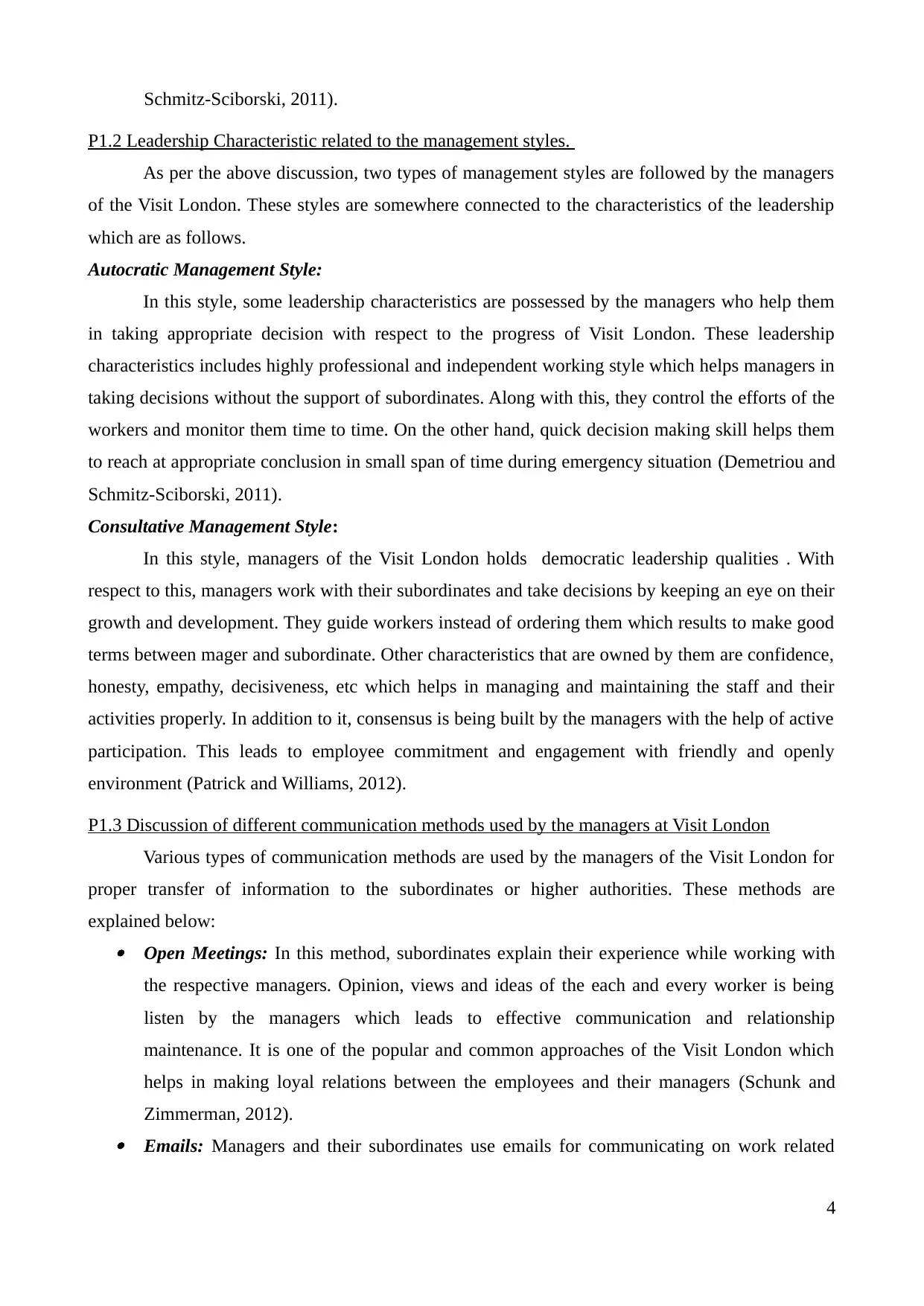
Schmitz-Sciborski, 2011).
P1.2 Leadership Characteristic related to the management styles.
As per the above discussion, two types of management styles are followed by the managers
of the Visit London. These styles are somewhere connected to the characteristics of the leadership
which are as follows.
Autocratic Management Style:
In this style, some leadership characteristics are possessed by the managers who help them
in taking appropriate decision with respect to the progress of Visit London. These leadership
characteristics includes highly professional and independent working style which helps managers in
taking decisions without the support of subordinates. Along with this, they control the efforts of the
workers and monitor them time to time. On the other hand, quick decision making skill helps them
to reach at appropriate conclusion in small span of time during emergency situation (Demetriou and
Schmitz-Sciborski, 2011).
Consultative Management Style:
In this style, managers of the Visit London holds democratic leadership qualities . With
respect to this, managers work with their subordinates and take decisions by keeping an eye on their
growth and development. They guide workers instead of ordering them which results to make good
terms between mager and subordinate. Other characteristics that are owned by them are confidence,
honesty, empathy, decisiveness, etc which helps in managing and maintaining the staff and their
activities properly. In addition to it, consensus is being built by the managers with the help of active
participation. This leads to employee commitment and engagement with friendly and openly
environment (Patrick and Williams, 2012).
P1.3 Discussion of different communication methods used by the managers at Visit London
Various types of communication methods are used by the managers of the Visit London for
proper transfer of information to the subordinates or higher authorities. These methods are
explained below: Open Meetings: In this method, subordinates explain their experience while working with
the respective managers. Opinion, views and ideas of the each and every worker is being
listen by the managers which leads to effective communication and relationship
maintenance. It is one of the popular and common approaches of the Visit London which
helps in making loyal relations between the employees and their managers (Schunk and
Zimmerman, 2012). Emails: Managers and their subordinates use emails for communicating on work related
4
P1.2 Leadership Characteristic related to the management styles.
As per the above discussion, two types of management styles are followed by the managers
of the Visit London. These styles are somewhere connected to the characteristics of the leadership
which are as follows.
Autocratic Management Style:
In this style, some leadership characteristics are possessed by the managers who help them
in taking appropriate decision with respect to the progress of Visit London. These leadership
characteristics includes highly professional and independent working style which helps managers in
taking decisions without the support of subordinates. Along with this, they control the efforts of the
workers and monitor them time to time. On the other hand, quick decision making skill helps them
to reach at appropriate conclusion in small span of time during emergency situation (Demetriou and
Schmitz-Sciborski, 2011).
Consultative Management Style:
In this style, managers of the Visit London holds democratic leadership qualities . With
respect to this, managers work with their subordinates and take decisions by keeping an eye on their
growth and development. They guide workers instead of ordering them which results to make good
terms between mager and subordinate. Other characteristics that are owned by them are confidence,
honesty, empathy, decisiveness, etc which helps in managing and maintaining the staff and their
activities properly. In addition to it, consensus is being built by the managers with the help of active
participation. This leads to employee commitment and engagement with friendly and openly
environment (Patrick and Williams, 2012).
P1.3 Discussion of different communication methods used by the managers at Visit London
Various types of communication methods are used by the managers of the Visit London for
proper transfer of information to the subordinates or higher authorities. These methods are
explained below: Open Meetings: In this method, subordinates explain their experience while working with
the respective managers. Opinion, views and ideas of the each and every worker is being
listen by the managers which leads to effective communication and relationship
maintenance. It is one of the popular and common approaches of the Visit London which
helps in making loyal relations between the employees and their managers (Schunk and
Zimmerman, 2012). Emails: Managers and their subordinates use emails for communicating on work related
4
Paraphrase This Document
Need a fresh take? Get an instant paraphrase of this document with our AI Paraphraser
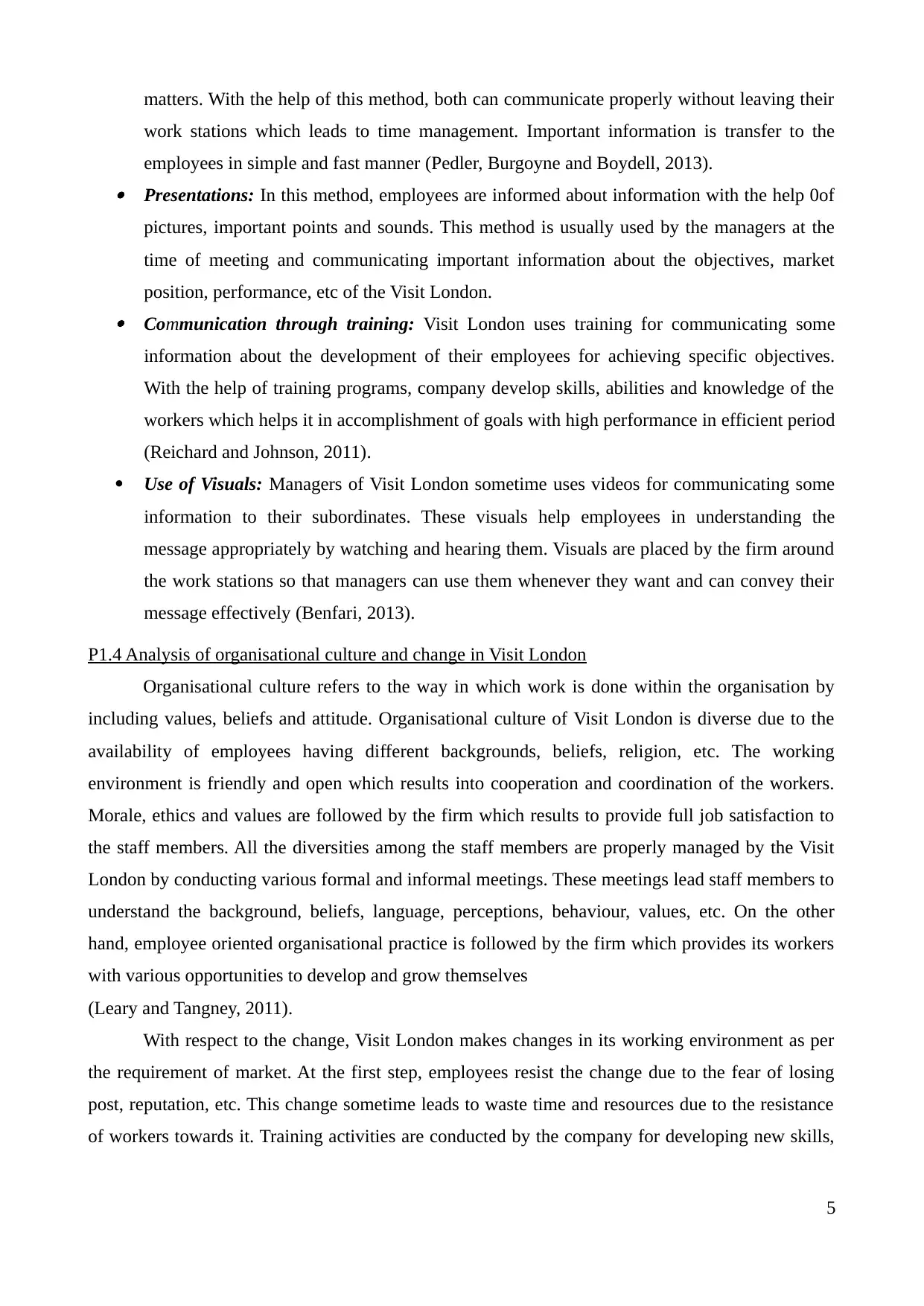
matters. With the help of this method, both can communicate properly without leaving their
work stations which leads to time management. Important information is transfer to the
employees in simple and fast manner (Pedler, Burgoyne and Boydell, 2013). Presentations: In this method, employees are informed about information with the help 0of
pictures, important points and sounds. This method is usually used by the managers at the
time of meeting and communicating important information about the objectives, market
position, performance, etc of the Visit London. Communication through training: Visit London uses training for communicating some
information about the development of their employees for achieving specific objectives.
With the help of training programs, company develop skills, abilities and knowledge of the
workers which helps it in accomplishment of goals with high performance in efficient period
(Reichard and Johnson, 2011).
Use of Visuals: Managers of Visit London sometime uses videos for communicating some
information to their subordinates. These visuals help employees in understanding the
message appropriately by watching and hearing them. Visuals are placed by the firm around
the work stations so that managers can use them whenever they want and can convey their
message effectively (Benfari, 2013).
P1.4 Analysis of organisational culture and change in Visit London
Organisational culture refers to the way in which work is done within the organisation by
including values, beliefs and attitude. Organisational culture of Visit London is diverse due to the
availability of employees having different backgrounds, beliefs, religion, etc. The working
environment is friendly and open which results into cooperation and coordination of the workers.
Morale, ethics and values are followed by the firm which results to provide full job satisfaction to
the staff members. All the diversities among the staff members are properly managed by the Visit
London by conducting various formal and informal meetings. These meetings lead staff members to
understand the background, beliefs, language, perceptions, behaviour, values, etc. On the other
hand, employee oriented organisational practice is followed by the firm which provides its workers
with various opportunities to develop and grow themselves
(Leary and Tangney, 2011).
With respect to the change, Visit London makes changes in its working environment as per
the requirement of market. At the first step, employees resist the change due to the fear of losing
post, reputation, etc. This change sometime leads to waste time and resources due to the resistance
of workers towards it. Training activities are conducted by the company for developing new skills,
5
work stations which leads to time management. Important information is transfer to the
employees in simple and fast manner (Pedler, Burgoyne and Boydell, 2013). Presentations: In this method, employees are informed about information with the help 0of
pictures, important points and sounds. This method is usually used by the managers at the
time of meeting and communicating important information about the objectives, market
position, performance, etc of the Visit London. Communication through training: Visit London uses training for communicating some
information about the development of their employees for achieving specific objectives.
With the help of training programs, company develop skills, abilities and knowledge of the
workers which helps it in accomplishment of goals with high performance in efficient period
(Reichard and Johnson, 2011).
Use of Visuals: Managers of Visit London sometime uses videos for communicating some
information to their subordinates. These visuals help employees in understanding the
message appropriately by watching and hearing them. Visuals are placed by the firm around
the work stations so that managers can use them whenever they want and can convey their
message effectively (Benfari, 2013).
P1.4 Analysis of organisational culture and change in Visit London
Organisational culture refers to the way in which work is done within the organisation by
including values, beliefs and attitude. Organisational culture of Visit London is diverse due to the
availability of employees having different backgrounds, beliefs, religion, etc. The working
environment is friendly and open which results into cooperation and coordination of the workers.
Morale, ethics and values are followed by the firm which results to provide full job satisfaction to
the staff members. All the diversities among the staff members are properly managed by the Visit
London by conducting various formal and informal meetings. These meetings lead staff members to
understand the background, beliefs, language, perceptions, behaviour, values, etc. On the other
hand, employee oriented organisational practice is followed by the firm which provides its workers
with various opportunities to develop and grow themselves
(Leary and Tangney, 2011).
With respect to the change, Visit London makes changes in its working environment as per
the requirement of market. At the first step, employees resist the change due to the fear of losing
post, reputation, etc. This change sometime leads to waste time and resources due to the resistance
of workers towards it. Training activities are conducted by the company for developing new skills,
5
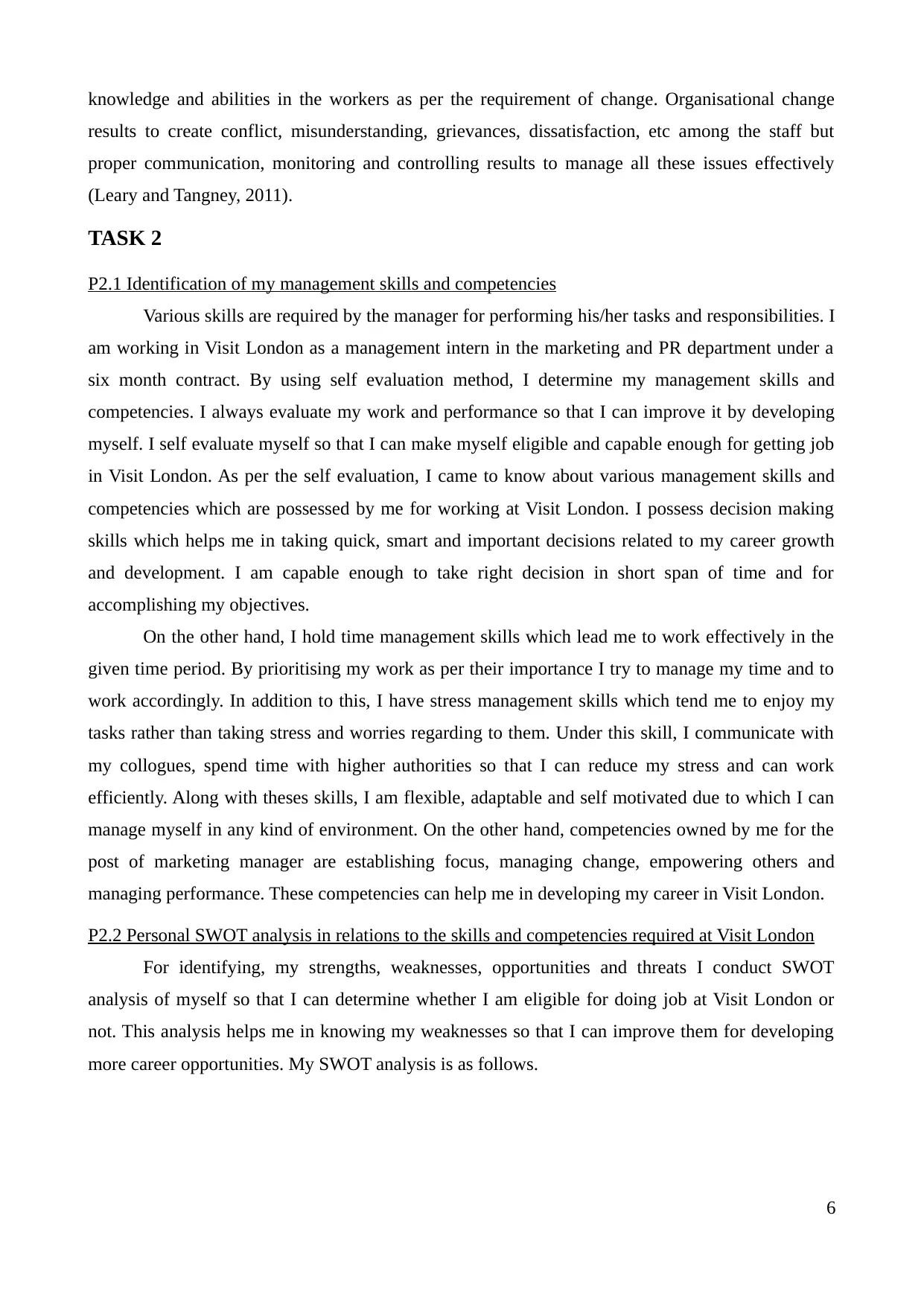
knowledge and abilities in the workers as per the requirement of change. Organisational change
results to create conflict, misunderstanding, grievances, dissatisfaction, etc among the staff but
proper communication, monitoring and controlling results to manage all these issues effectively
(Leary and Tangney, 2011).
TASK 2
P2.1 Identification of my management skills and competencies
Various skills are required by the manager for performing his/her tasks and responsibilities. I
am working in Visit London as a management intern in the marketing and PR department under a
six month contract. By using self evaluation method, I determine my management skills and
competencies. I always evaluate my work and performance so that I can improve it by developing
myself. I self evaluate myself so that I can make myself eligible and capable enough for getting job
in Visit London. As per the self evaluation, I came to know about various management skills and
competencies which are possessed by me for working at Visit London. I possess decision making
skills which helps me in taking quick, smart and important decisions related to my career growth
and development. I am capable enough to take right decision in short span of time and for
accomplishing my objectives.
On the other hand, I hold time management skills which lead me to work effectively in the
given time period. By prioritising my work as per their importance I try to manage my time and to
work accordingly. In addition to this, I have stress management skills which tend me to enjoy my
tasks rather than taking stress and worries regarding to them. Under this skill, I communicate with
my collogues, spend time with higher authorities so that I can reduce my stress and can work
efficiently. Along with theses skills, I am flexible, adaptable and self motivated due to which I can
manage myself in any kind of environment. On the other hand, competencies owned by me for the
post of marketing manager are establishing focus, managing change, empowering others and
managing performance. These competencies can help me in developing my career in Visit London.
P2.2 Personal SWOT analysis in relations to the skills and competencies required at Visit London
For identifying, my strengths, weaknesses, opportunities and threats I conduct SWOT
analysis of myself so that I can determine whether I am eligible for doing job at Visit London or
not. This analysis helps me in knowing my weaknesses so that I can improve them for developing
more career opportunities. My SWOT analysis is as follows.
6
results to create conflict, misunderstanding, grievances, dissatisfaction, etc among the staff but
proper communication, monitoring and controlling results to manage all these issues effectively
(Leary and Tangney, 2011).
TASK 2
P2.1 Identification of my management skills and competencies
Various skills are required by the manager for performing his/her tasks and responsibilities. I
am working in Visit London as a management intern in the marketing and PR department under a
six month contract. By using self evaluation method, I determine my management skills and
competencies. I always evaluate my work and performance so that I can improve it by developing
myself. I self evaluate myself so that I can make myself eligible and capable enough for getting job
in Visit London. As per the self evaluation, I came to know about various management skills and
competencies which are possessed by me for working at Visit London. I possess decision making
skills which helps me in taking quick, smart and important decisions related to my career growth
and development. I am capable enough to take right decision in short span of time and for
accomplishing my objectives.
On the other hand, I hold time management skills which lead me to work effectively in the
given time period. By prioritising my work as per their importance I try to manage my time and to
work accordingly. In addition to this, I have stress management skills which tend me to enjoy my
tasks rather than taking stress and worries regarding to them. Under this skill, I communicate with
my collogues, spend time with higher authorities so that I can reduce my stress and can work
efficiently. Along with theses skills, I am flexible, adaptable and self motivated due to which I can
manage myself in any kind of environment. On the other hand, competencies owned by me for the
post of marketing manager are establishing focus, managing change, empowering others and
managing performance. These competencies can help me in developing my career in Visit London.
P2.2 Personal SWOT analysis in relations to the skills and competencies required at Visit London
For identifying, my strengths, weaknesses, opportunities and threats I conduct SWOT
analysis of myself so that I can determine whether I am eligible for doing job at Visit London or
not. This analysis helps me in knowing my weaknesses so that I can improve them for developing
more career opportunities. My SWOT analysis is as follows.
6
⊘ This is a preview!⊘
Do you want full access?
Subscribe today to unlock all pages.

Trusted by 1+ million students worldwide
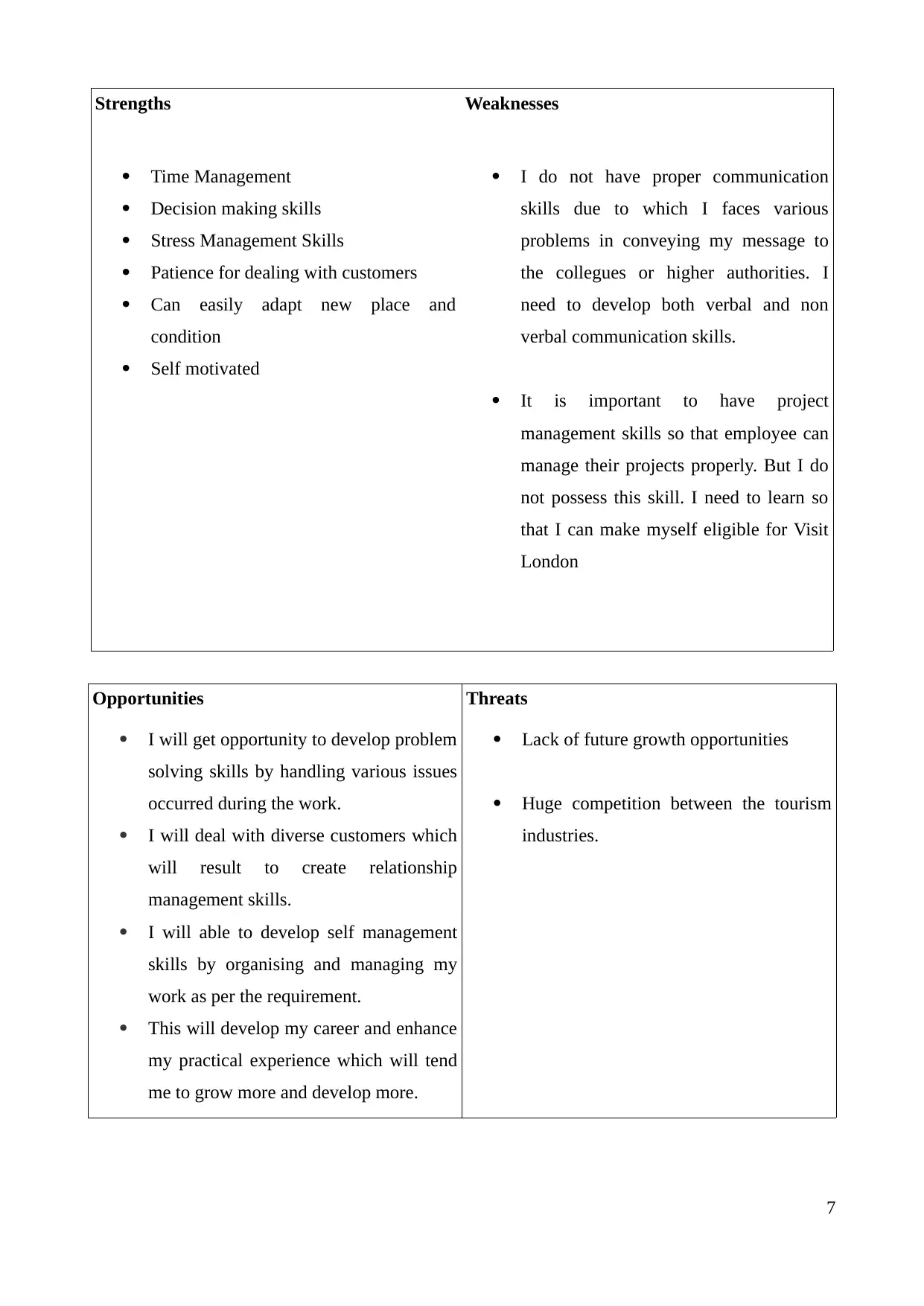
Strengths Weaknesses
Time Management
Decision making skills
Stress Management Skills
Patience for dealing with customers
Can easily adapt new place and
condition
Self motivated
I do not have proper communication
skills due to which I faces various
problems in conveying my message to
the collegues or higher authorities. I
need to develop both verbal and non
verbal communication skills.
It is important to have project
management skills so that employee can
manage their projects properly. But I do
not possess this skill. I need to learn so
that I can make myself eligible for Visit
London
Opportunities Threats
I will get opportunity to develop problem
solving skills by handling various issues
occurred during the work.
I will deal with diverse customers which
will result to create relationship
management skills.
I will able to develop self management
skills by organising and managing my
work as per the requirement.
This will develop my career and enhance
my practical experience which will tend
me to grow more and develop more.
Lack of future growth opportunities
Huge competition between the tourism
industries.
7
Time Management
Decision making skills
Stress Management Skills
Patience for dealing with customers
Can easily adapt new place and
condition
Self motivated
I do not have proper communication
skills due to which I faces various
problems in conveying my message to
the collegues or higher authorities. I
need to develop both verbal and non
verbal communication skills.
It is important to have project
management skills so that employee can
manage their projects properly. But I do
not possess this skill. I need to learn so
that I can make myself eligible for Visit
London
Opportunities Threats
I will get opportunity to develop problem
solving skills by handling various issues
occurred during the work.
I will deal with diverse customers which
will result to create relationship
management skills.
I will able to develop self management
skills by organising and managing my
work as per the requirement.
This will develop my career and enhance
my practical experience which will tend
me to grow more and develop more.
Lack of future growth opportunities
Huge competition between the tourism
industries.
7
Paraphrase This Document
Need a fresh take? Get an instant paraphrase of this document with our AI Paraphraser
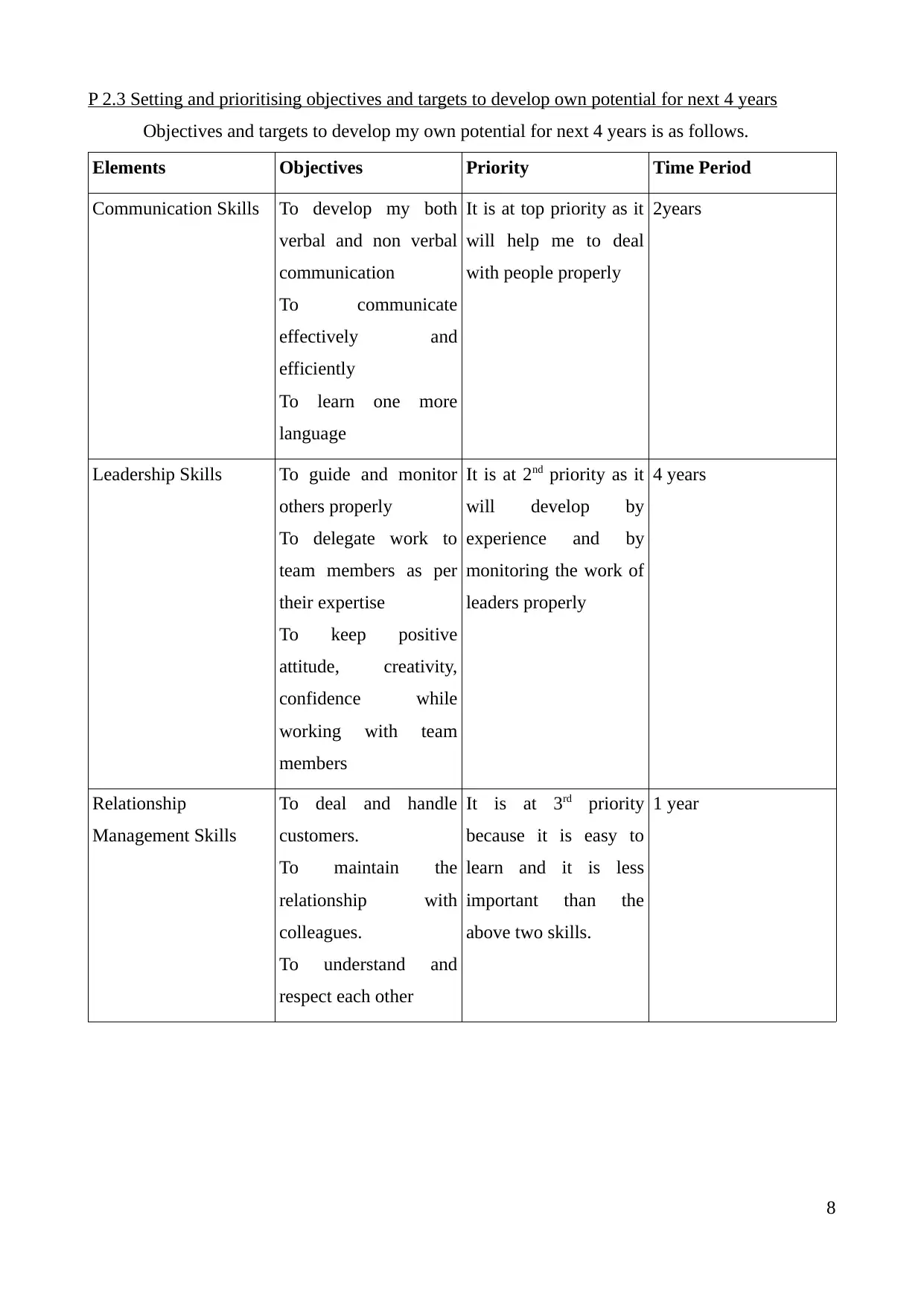
P 2.3 Setting and prioritising objectives and targets to develop own potential for next 4 years
Objectives and targets to develop my own potential for next 4 years is as follows.
Elements Objectives Priority Time Period
Communication Skills To develop my both
verbal and non verbal
communication
To communicate
effectively and
efficiently
To learn one more
language
It is at top priority as it
will help me to deal
with people properly
2years
Leadership Skills To guide and monitor
others properly
To delegate work to
team members as per
their expertise
To keep positive
attitude, creativity,
confidence while
working with team
members
It is at 2nd priority as it
will develop by
experience and by
monitoring the work of
leaders properly
4 years
Relationship
Management Skills
To deal and handle
customers.
To maintain the
relationship with
colleagues.
To understand and
respect each other
It is at 3rd priority
because it is easy to
learn and it is less
important than the
above two skills.
1 year
8
Objectives and targets to develop my own potential for next 4 years is as follows.
Elements Objectives Priority Time Period
Communication Skills To develop my both
verbal and non verbal
communication
To communicate
effectively and
efficiently
To learn one more
language
It is at top priority as it
will help me to deal
with people properly
2years
Leadership Skills To guide and monitor
others properly
To delegate work to
team members as per
their expertise
To keep positive
attitude, creativity,
confidence while
working with team
members
It is at 2nd priority as it
will develop by
experience and by
monitoring the work of
leaders properly
4 years
Relationship
Management Skills
To deal and handle
customers.
To maintain the
relationship with
colleagues.
To understand and
respect each other
It is at 3rd priority
because it is easy to
learn and it is less
important than the
above two skills.
1 year
8
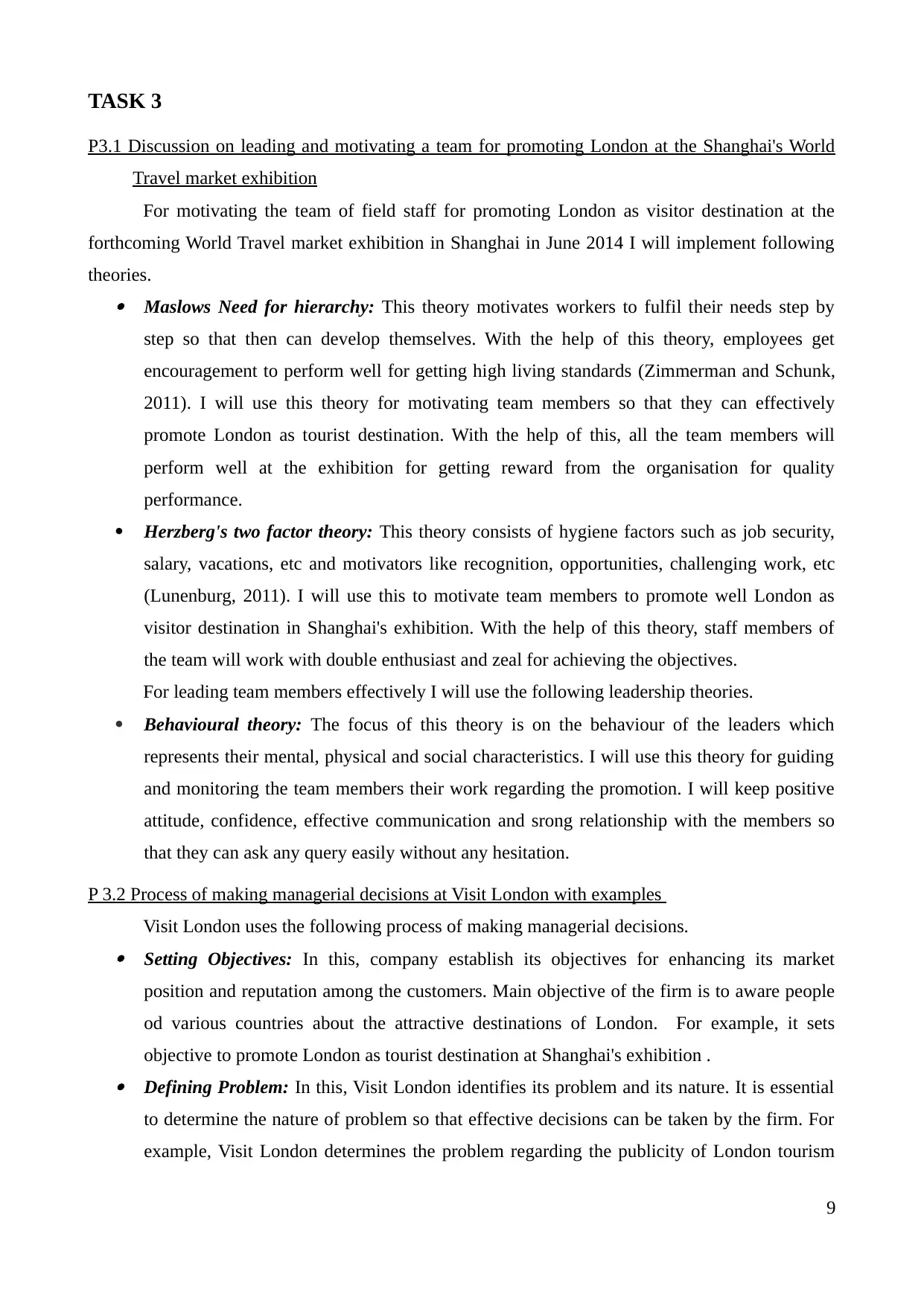
TASK 3
P3.1 Discussion on leading and motivating a team for promoting London at the Shanghai's World
Travel market exhibition
For motivating the team of field staff for promoting London as visitor destination at the
forthcoming World Travel market exhibition in Shanghai in June 2014 I will implement following
theories. Maslows Need for hierarchy: This theory motivates workers to fulfil their needs step by
step so that then can develop themselves. With the help of this theory, employees get
encouragement to perform well for getting high living standards (Zimmerman and Schunk,
2011). I will use this theory for motivating team members so that they can effectively
promote London as tourist destination. With the help of this, all the team members will
perform well at the exhibition for getting reward from the organisation for quality
performance.
Herzberg's two factor theory: This theory consists of hygiene factors such as job security,
salary, vacations, etc and motivators like recognition, opportunities, challenging work, etc
(Lunenburg, 2011). I will use this to motivate team members to promote well London as
visitor destination in Shanghai's exhibition. With the help of this theory, staff members of
the team will work with double enthusiast and zeal for achieving the objectives.
For leading team members effectively I will use the following leadership theories.
Behavioural theory: The focus of this theory is on the behaviour of the leaders which
represents their mental, physical and social characteristics. I will use this theory for guiding
and monitoring the team members their work regarding the promotion. I will keep positive
attitude, confidence, effective communication and srong relationship with the members so
that they can ask any query easily without any hesitation.
P 3.2 Process of making managerial decisions at Visit London with examples
Visit London uses the following process of making managerial decisions. Setting Objectives: In this, company establish its objectives for enhancing its market
position and reputation among the customers. Main objective of the firm is to aware people
od various countries about the attractive destinations of London. For example, it sets
objective to promote London as tourist destination at Shanghai's exhibition . Defining Problem: In this, Visit London identifies its problem and its nature. It is essential
to determine the nature of problem so that effective decisions can be taken by the firm. For
example, Visit London determines the problem regarding the publicity of London tourism
9
P3.1 Discussion on leading and motivating a team for promoting London at the Shanghai's World
Travel market exhibition
For motivating the team of field staff for promoting London as visitor destination at the
forthcoming World Travel market exhibition in Shanghai in June 2014 I will implement following
theories. Maslows Need for hierarchy: This theory motivates workers to fulfil their needs step by
step so that then can develop themselves. With the help of this theory, employees get
encouragement to perform well for getting high living standards (Zimmerman and Schunk,
2011). I will use this theory for motivating team members so that they can effectively
promote London as tourist destination. With the help of this, all the team members will
perform well at the exhibition for getting reward from the organisation for quality
performance.
Herzberg's two factor theory: This theory consists of hygiene factors such as job security,
salary, vacations, etc and motivators like recognition, opportunities, challenging work, etc
(Lunenburg, 2011). I will use this to motivate team members to promote well London as
visitor destination in Shanghai's exhibition. With the help of this theory, staff members of
the team will work with double enthusiast and zeal for achieving the objectives.
For leading team members effectively I will use the following leadership theories.
Behavioural theory: The focus of this theory is on the behaviour of the leaders which
represents their mental, physical and social characteristics. I will use this theory for guiding
and monitoring the team members their work regarding the promotion. I will keep positive
attitude, confidence, effective communication and srong relationship with the members so
that they can ask any query easily without any hesitation.
P 3.2 Process of making managerial decisions at Visit London with examples
Visit London uses the following process of making managerial decisions. Setting Objectives: In this, company establish its objectives for enhancing its market
position and reputation among the customers. Main objective of the firm is to aware people
od various countries about the attractive destinations of London. For example, it sets
objective to promote London as tourist destination at Shanghai's exhibition . Defining Problem: In this, Visit London identifies its problem and its nature. It is essential
to determine the nature of problem so that effective decisions can be taken by the firm. For
example, Visit London determines the problem regarding the publicity of London tourism
9
⊘ This is a preview!⊘
Do you want full access?
Subscribe today to unlock all pages.

Trusted by 1+ million students worldwide
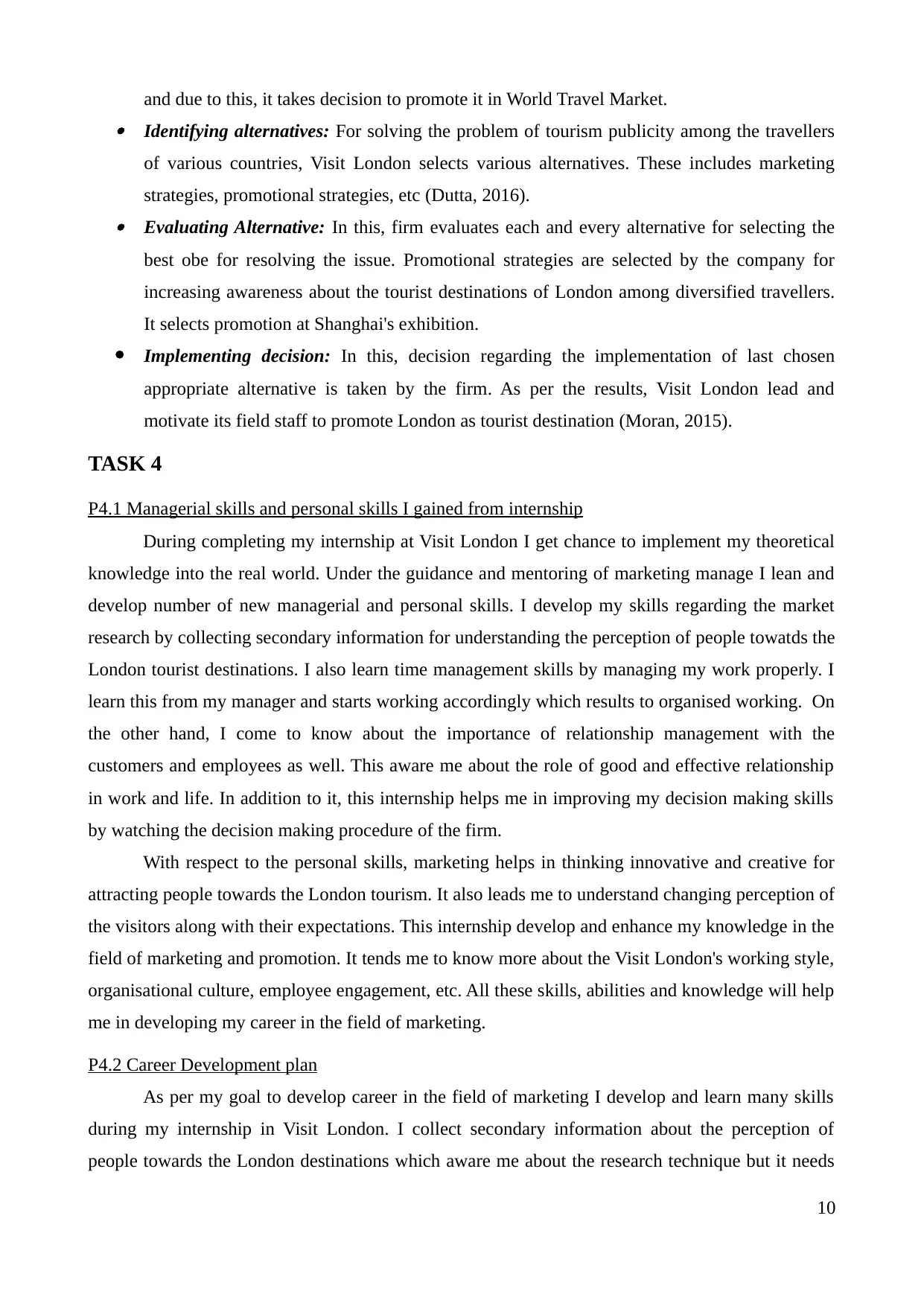
and due to this, it takes decision to promote it in World Travel Market. Identifying alternatives: For solving the problem of tourism publicity among the travellers
of various countries, Visit London selects various alternatives. These includes marketing
strategies, promotional strategies, etc (Dutta, 2016). Evaluating Alternative: In this, firm evaluates each and every alternative for selecting the
best obe for resolving the issue. Promotional strategies are selected by the company for
increasing awareness about the tourist destinations of London among diversified travellers.
It selects promotion at Shanghai's exhibition.
Implementing decision: In this, decision regarding the implementation of last chosen
appropriate alternative is taken by the firm. As per the results, Visit London lead and
motivate its field staff to promote London as tourist destination (Moran, 2015).
TASK 4
P4.1 Managerial skills and personal skills I gained from internship
During completing my internship at Visit London I get chance to implement my theoretical
knowledge into the real world. Under the guidance and mentoring of marketing manage I lean and
develop number of new managerial and personal skills. I develop my skills regarding the market
research by collecting secondary information for understanding the perception of people towatds the
London tourist destinations. I also learn time management skills by managing my work properly. I
learn this from my manager and starts working accordingly which results to organised working. On
the other hand, I come to know about the importance of relationship management with the
customers and employees as well. This aware me about the role of good and effective relationship
in work and life. In addition to it, this internship helps me in improving my decision making skills
by watching the decision making procedure of the firm.
With respect to the personal skills, marketing helps in thinking innovative and creative for
attracting people towards the London tourism. It also leads me to understand changing perception of
the visitors along with their expectations. This internship develop and enhance my knowledge in the
field of marketing and promotion. It tends me to know more about the Visit London's working style,
organisational culture, employee engagement, etc. All these skills, abilities and knowledge will help
me in developing my career in the field of marketing.
P4.2 Career Development plan
As per my goal to develop career in the field of marketing I develop and learn many skills
during my internship in Visit London. I collect secondary information about the perception of
people towards the London destinations which aware me about the research technique but it needs
10
of various countries, Visit London selects various alternatives. These includes marketing
strategies, promotional strategies, etc (Dutta, 2016). Evaluating Alternative: In this, firm evaluates each and every alternative for selecting the
best obe for resolving the issue. Promotional strategies are selected by the company for
increasing awareness about the tourist destinations of London among diversified travellers.
It selects promotion at Shanghai's exhibition.
Implementing decision: In this, decision regarding the implementation of last chosen
appropriate alternative is taken by the firm. As per the results, Visit London lead and
motivate its field staff to promote London as tourist destination (Moran, 2015).
TASK 4
P4.1 Managerial skills and personal skills I gained from internship
During completing my internship at Visit London I get chance to implement my theoretical
knowledge into the real world. Under the guidance and mentoring of marketing manage I lean and
develop number of new managerial and personal skills. I develop my skills regarding the market
research by collecting secondary information for understanding the perception of people towatds the
London tourist destinations. I also learn time management skills by managing my work properly. I
learn this from my manager and starts working accordingly which results to organised working. On
the other hand, I come to know about the importance of relationship management with the
customers and employees as well. This aware me about the role of good and effective relationship
in work and life. In addition to it, this internship helps me in improving my decision making skills
by watching the decision making procedure of the firm.
With respect to the personal skills, marketing helps in thinking innovative and creative for
attracting people towards the London tourism. It also leads me to understand changing perception of
the visitors along with their expectations. This internship develop and enhance my knowledge in the
field of marketing and promotion. It tends me to know more about the Visit London's working style,
organisational culture, employee engagement, etc. All these skills, abilities and knowledge will help
me in developing my career in the field of marketing.
P4.2 Career Development plan
As per my goal to develop career in the field of marketing I develop and learn many skills
during my internship in Visit London. I collect secondary information about the perception of
people towards the London destinations which aware me about the research technique but it needs
10
Paraphrase This Document
Need a fresh take? Get an instant paraphrase of this document with our AI Paraphraser
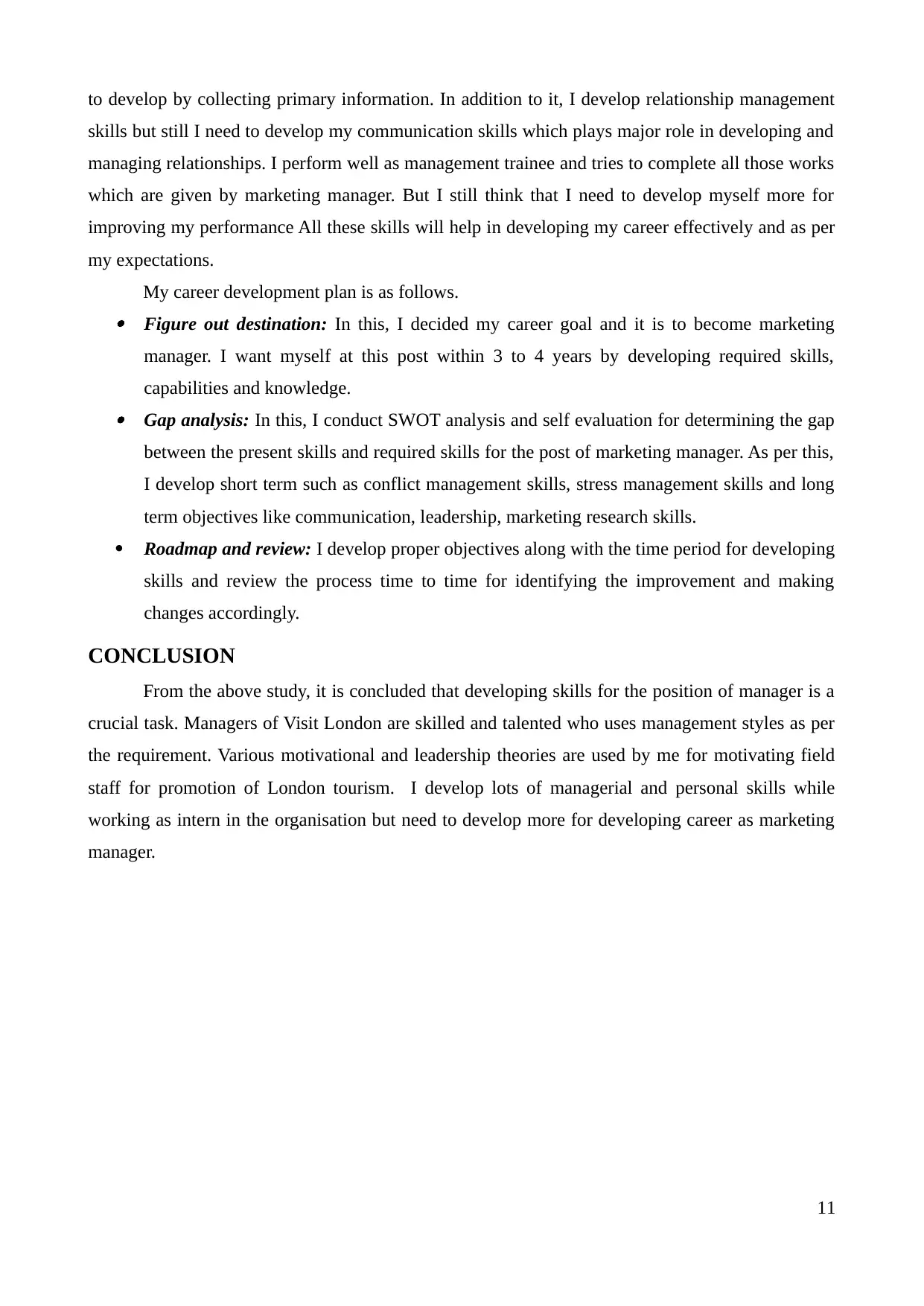
to develop by collecting primary information. In addition to it, I develop relationship management
skills but still I need to develop my communication skills which plays major role in developing and
managing relationships. I perform well as management trainee and tries to complete all those works
which are given by marketing manager. But I still think that I need to develop myself more for
improving my performance All these skills will help in developing my career effectively and as per
my expectations.
My career development plan is as follows. Figure out destination: In this, I decided my career goal and it is to become marketing
manager. I want myself at this post within 3 to 4 years by developing required skills,
capabilities and knowledge. Gap analysis: In this, I conduct SWOT analysis and self evaluation for determining the gap
between the present skills and required skills for the post of marketing manager. As per this,
I develop short term such as conflict management skills, stress management skills and long
term objectives like communication, leadership, marketing research skills.
Roadmap and review: I develop proper objectives along with the time period for developing
skills and review the process time to time for identifying the improvement and making
changes accordingly.
CONCLUSION
From the above study, it is concluded that developing skills for the position of manager is a
crucial task. Managers of Visit London are skilled and talented who uses management styles as per
the requirement. Various motivational and leadership theories are used by me for motivating field
staff for promotion of London tourism. I develop lots of managerial and personal skills while
working as intern in the organisation but need to develop more for developing career as marketing
manager.
11
skills but still I need to develop my communication skills which plays major role in developing and
managing relationships. I perform well as management trainee and tries to complete all those works
which are given by marketing manager. But I still think that I need to develop myself more for
improving my performance All these skills will help in developing my career effectively and as per
my expectations.
My career development plan is as follows. Figure out destination: In this, I decided my career goal and it is to become marketing
manager. I want myself at this post within 3 to 4 years by developing required skills,
capabilities and knowledge. Gap analysis: In this, I conduct SWOT analysis and self evaluation for determining the gap
between the present skills and required skills for the post of marketing manager. As per this,
I develop short term such as conflict management skills, stress management skills and long
term objectives like communication, leadership, marketing research skills.
Roadmap and review: I develop proper objectives along with the time period for developing
skills and review the process time to time for identifying the improvement and making
changes accordingly.
CONCLUSION
From the above study, it is concluded that developing skills for the position of manager is a
crucial task. Managers of Visit London are skilled and talented who uses management styles as per
the requirement. Various motivational and leadership theories are used by me for motivating field
staff for promotion of London tourism. I develop lots of managerial and personal skills while
working as intern in the organisation but need to develop more for developing career as marketing
manager.
11
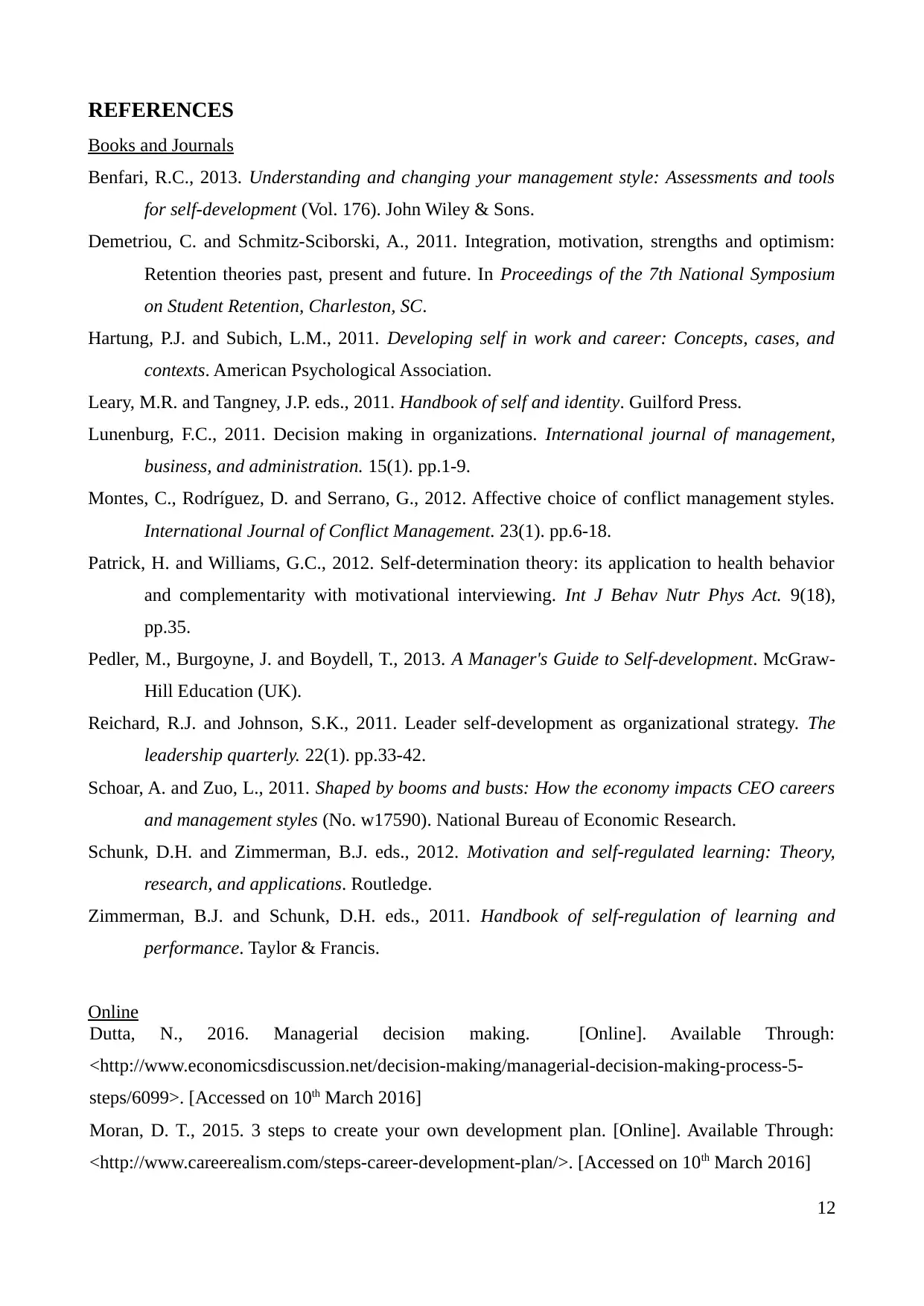
REFERENCES
Books and Journals
Benfari, R.C., 2013. Understanding and changing your management style: Assessments and tools
for self-development (Vol. 176). John Wiley & Sons.
Demetriou, C. and Schmitz-Sciborski, A., 2011. Integration, motivation, strengths and optimism:
Retention theories past, present and future. In Proceedings of the 7th National Symposium
on Student Retention, Charleston, SC.
Hartung, P.J. and Subich, L.M., 2011. Developing self in work and career: Concepts, cases, and
contexts. American Psychological Association.
Leary, M.R. and Tangney, J.P. eds., 2011. Handbook of self and identity. Guilford Press.
Lunenburg, F.C., 2011. Decision making in organizations. International journal of management,
business, and administration. 15(1). pp.1-9.
Montes, C., Rodríguez, D. and Serrano, G., 2012. Affective choice of conflict management styles.
International Journal of Conflict Management. 23(1). pp.6-18.
Patrick, H. and Williams, G.C., 2012. Self-determination theory: its application to health behavior
and complementarity with motivational interviewing. Int J Behav Nutr Phys Act. 9(18),
pp.35.
Pedler, M., Burgoyne, J. and Boydell, T., 2013. A Manager's Guide to Self-development. McGraw-
Hill Education (UK).
Reichard, R.J. and Johnson, S.K., 2011. Leader self-development as organizational strategy. The
leadership quarterly. 22(1). pp.33-42.
Schoar, A. and Zuo, L., 2011. Shaped by booms and busts: How the economy impacts CEO careers
and management styles (No. w17590). National Bureau of Economic Research.
Schunk, D.H. and Zimmerman, B.J. eds., 2012. Motivation and self-regulated learning: Theory,
research, and applications. Routledge.
Zimmerman, B.J. and Schunk, D.H. eds., 2011. Handbook of self-regulation of learning and
performance. Taylor & Francis.
Online
Dutta, N., 2016. Managerial decision making. [Online]. Available Through:
<http://www.economicsdiscussion.net/decision-making/managerial-decision-making-process-5-
steps/6099>. [Accessed on 10th March 2016]
Moran, D. T., 2015. 3 steps to create your own development plan. [Online]. Available Through:
<http://www.careerealism.com/steps-career-development-plan/>. [Accessed on 10th March 2016]
12
Books and Journals
Benfari, R.C., 2013. Understanding and changing your management style: Assessments and tools
for self-development (Vol. 176). John Wiley & Sons.
Demetriou, C. and Schmitz-Sciborski, A., 2011. Integration, motivation, strengths and optimism:
Retention theories past, present and future. In Proceedings of the 7th National Symposium
on Student Retention, Charleston, SC.
Hartung, P.J. and Subich, L.M., 2011. Developing self in work and career: Concepts, cases, and
contexts. American Psychological Association.
Leary, M.R. and Tangney, J.P. eds., 2011. Handbook of self and identity. Guilford Press.
Lunenburg, F.C., 2011. Decision making in organizations. International journal of management,
business, and administration. 15(1). pp.1-9.
Montes, C., Rodríguez, D. and Serrano, G., 2012. Affective choice of conflict management styles.
International Journal of Conflict Management. 23(1). pp.6-18.
Patrick, H. and Williams, G.C., 2012. Self-determination theory: its application to health behavior
and complementarity with motivational interviewing. Int J Behav Nutr Phys Act. 9(18),
pp.35.
Pedler, M., Burgoyne, J. and Boydell, T., 2013. A Manager's Guide to Self-development. McGraw-
Hill Education (UK).
Reichard, R.J. and Johnson, S.K., 2011. Leader self-development as organizational strategy. The
leadership quarterly. 22(1). pp.33-42.
Schoar, A. and Zuo, L., 2011. Shaped by booms and busts: How the economy impacts CEO careers
and management styles (No. w17590). National Bureau of Economic Research.
Schunk, D.H. and Zimmerman, B.J. eds., 2012. Motivation and self-regulated learning: Theory,
research, and applications. Routledge.
Zimmerman, B.J. and Schunk, D.H. eds., 2011. Handbook of self-regulation of learning and
performance. Taylor & Francis.
Online
Dutta, N., 2016. Managerial decision making. [Online]. Available Through:
<http://www.economicsdiscussion.net/decision-making/managerial-decision-making-process-5-
steps/6099>. [Accessed on 10th March 2016]
Moran, D. T., 2015. 3 steps to create your own development plan. [Online]. Available Through:
<http://www.careerealism.com/steps-career-development-plan/>. [Accessed on 10th March 2016]
12
⊘ This is a preview!⊘
Do you want full access?
Subscribe today to unlock all pages.

Trusted by 1+ million students worldwide
1 out of 13
Related Documents
Your All-in-One AI-Powered Toolkit for Academic Success.
+13062052269
info@desklib.com
Available 24*7 on WhatsApp / Email
![[object Object]](/_next/static/media/star-bottom.7253800d.svg)
Unlock your academic potential
Copyright © 2020–2026 A2Z Services. All Rights Reserved. Developed and managed by ZUCOL.





